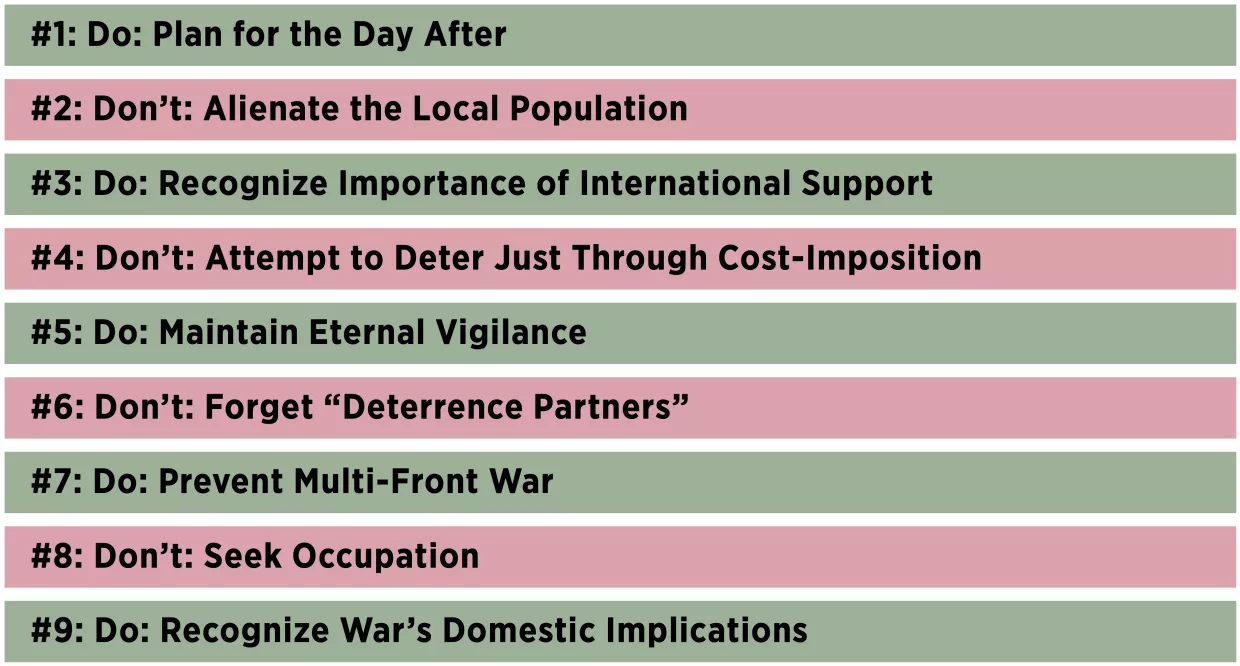Foreword
Since its founding in 1948, Israel has been engaged in a series of forever wars. After each war, the IDF, Mossad, Shin Bet, and others in the intelligence and security community analyze what happened and summarize their findings in after-action, or “lessons learned,” reports. Former leaders from these institutions, many of whom retain close relations with their successors, also produce reports on what happened and identify takeaways for the future. Thus, in trying to make sense of what’s happening now, lessons these experts have distilled from their experiences provide a sound starting point.
Over two decades as director of Harvard’s Belfer Center for Science and International Affairs, I was fortunate to build connections with many of the current and former leaders of these institutions, both when they were in office and in further chapters of their careers. Thirty years ago, Ami Ayalon, former head of Shin Bet, was a student at HKS and has remained an alumnus we’re proud of. After more than a decade as a close colleague and senior fellow at the Belfer Center, Shai Feldman returned to Israel to become the director the Jaffee Center—which subsequently was renamed the Institute for National Security Studies (INSS). His successor, Amos Yadlin, former head of Israel’s military intelligence, has been a member of the HKS extended family as a graduate of the school and frequent visitor. Many of the analysts who worked at INSS and at other sibling centers have also been valuable colleagues. After retiring from decades of service both in uniform and in the Israeli government, Ehud Barak joined us as a senior fellow and offered us his unique perspective on Israel’s security agenda. When he ended his service as Mossad director in 2016, Tamir Pardo also joined us as a senior fellow.
What American readers of these reports may find most surprising is the candor in calling failures by their real names, and their readiness to accept responsibility rather than simply attempting to pin the blame on a few errant bad apples. Many of the most interesting insights from Israel’s earlier wars are to be found in reports that are not readily accessible. Thus, in this paper we have attempted to collect and review these efforts, and to summarize a number of key lessons in ways that will help policymakers and observers as Israel now faces the most serious challenge in its nearly eight decades of existence as a modern state.
The report begins by presenting a brief summary of major takeaways—ours, as well as those of the experts—as context for the broader report. It then offers a timeline of each war, alongside a brief description of each. We conclude with a selection of quotations from Israeli military and security analysts, summarized under nine lessons for the future.
Graham T. Allison
Douglas Dillon Professor of Government, Harvard University
Introduction
In trying to extract signals from the cacophony of images and words that has erupted since Hamas’s horrific attack of October 7 that killed 1,200 innocent Israelis, we have found the best source of insight comes from former Israeli military and intelligence leaders who have spent their lives attempting to ensure Israel’s survival in a series of “forever wars.” Fortunately, at Harvard’s Belfer Center for Science and International Affairs, we have the opportunity to engage scores of these leaders as colleagues and friends. Four who have recently written and spoken about what is now happening have, in our view, been especially illuminating: Amos Yadlin (a former student at HKS, chief of Israel’s military intelligence, and subsequently head of Israel’s major think tank, INSS); Ehud Barak (Israel’s most decorated warrior and former Prime Minister); as well as Tamir Pardo and Ami Ayalon (former heads of Mossad and Shin Bet, Israel’s equivalent of the CIA and FBI, respectively).
While they have offered scores of instructive observations, this discussion paper will underline nine of the lessons learned from Israelis—and others with unique insight into Israel—over the almost eight decades since Israel’s founding in 1948. For context on their lessons, we begin with six points of our own about the current situation.
First, amid a host of complexities, it’s essential to begin with one simple truth: Hamas’s October 7 attack was evil—pure, simple, unadulterated evil. No excuses, justifications, or contextualization should be allowed to cloud the clarity of this simple truth.
Second, nothing in history happens in a vacuum. While we often focus on a snapshot of a moment in time, we know that life is a movie of successive frames leading up to the present. Understanding what has previously been done, and not done, to shape developments in the past is essential in attempting to assess what will happen in the future.
Third, the Biden Administration’s immediate response condemning this act of terrorism as “evil,” and affirming that the US will stand shoulder-to-shoulder with our ally and provide whatever support Israel requires to exercise its right of self-defense, was precisely the way a responsible great-power ally should respond.
Fourth, in going further to not only stand with Israel, but, as President Biden did, stand in Israel with Israel, the Administration went above and beyond. Careful observers of what the Administration has done would note that in the first weeks after the terrorist attack, holding Prime Minister Netanyahu close by having American or allied leaders in Jerusalem almost continuously since the attack(first Blinken, then Austin, then Biden, and then British Prime Minister Sunak), has helped him and his government get beyond the understandable trauma and outrage that demanded immediate retaliation in ways that would make Israel’s security situation worse rather than better. Over three months since the original attack and subsequent war, Biden’s attempt to hug Netanyahu tight continues to serve a valuable purpose. As the Book of Proverbs warned, “A fool expresses all his emotions, but a wise person controls them”—preventing emotions from clouding strategic judgment poses a profound challenge.
Fifth, Israel is currently facing its gravest security challenge since the modern Israeli state was founded. Israel’s response to the current war in Gaza may well provide a provocation—or pretext—for conflict with Hezbollah in Lebanon, with Iran-backed militias in Syria, in the West Bank, inside Israel, with Iran, or even on Israel’s southern border with Egypt.
As former Prime Minister Barak was one of the first to point out, Hamas’s terror attack constitutes the biggest failure of Israeli intelligence, military preparation, and most importantly political leadership in Israel’s history. The officials now in office pursuing the war recognize that when the fighting ends, they will be held to account. But since they remain the key actors currently responding to this failure, there is a real danger that some may be thinking more about justifying their own behavior than about the safety and security of their nation.
Sixth, what about the Palestinians? Every strategist knows that the actions Israeli governments have taken to deal with the Palestinians have been self-defeating. From founder Ben-Gurion to Prime Ministers Rabin, Sharon, Barak, and Peres, Israeli leaders have agreed that the one solution—and only solution— to Israel’s long-term quest for survival and security requires that the land between the river and the sea be divided into two states: one for Israel and one for Palestine. Ami Ayalon captures the lesson from Israeli intelligence professionals who spent their careers preventing terrorism: “To kill terrorist leaders without addressing the despair of their supporters is a fool’s errand and produces more frustration, more despair, and more terrorism.” Counterterrorism, then, is not just about taking bad actors off the field, but also addressing the factors that create and motivate them. In their unambiguous rejection of this necessity, Netanyahu and his right-wing, extremist coalition have predictably outraged not only Palestinians and Arabs in the region, but serious observers around the world. They have divided the Israeli nation, with former Bibi ally and Deputy Prime Minister Dan Meridor warning that Netanyahu was willing to “pay any price” to return as prime minister, even if it means aligning with those who seek to inflame the situation in the West Bank. While their crimes cannot excuse the inexcusable or justify the unjustifiable, they created conditions that—as Israel’s intelligence agencies repeatedly warned—made extreme responses predictable.
Among the many wars Israel has fought, its experiences in Lebanon are the most frequently cited by former military, government, and intelligence leaders. In 1982 Israel invaded Lebanon and occupied Beirut to eject the Palestinian Liberation Organization (PLO). In 1985 Israel withdrew to a security zone in southern Lebanon with the hope of stabilizing its northern border. Yet the next 15 years were marked by inconclusive fighting and the continuing loss of Israeli soldiers, ultimately leading Prime Minister Barak to unilaterally withdraw all Israeli forces from the territory. This left fertile ground for the growth of Hezbollah, which today is the world’s strongest paramilitary group, with an arsenal of 150,000 missiles and rockets targeting Israel.
The return of conflict to Gaza has also offered an opportunity for Israeli strategists to restudy their previous rounds with Hamas—most notably in 2008 and 2014— and the lessons of counterterrorism more broadly. Here, they have been analyzing how terrorist groups can be deterred, managed, or, if necessary, defeated—and how this applies to Hamas, a quasi-state entity deeply embedded within the Palestinian population. And while Hamas is not ISIS, the US fight against the Islamic State offers clues to how the operational capability of extremist groups can be successfully and permanently degraded. The Six-Day War of 1967 and Yom Kippur War of 1973 also offer insights into how regional conflicts can be contained and managed.
Among the major lessons from Israel’s experiences in earlier wars, five deserve special attention.
First, as Clausewitz taught students of strategy, war is not an end in itself. War is a means to an end, the application of organized violence to achieve geopolitical objectives. While politicians often focus on fighting first and postpone planning until later, Clausewitz insists that strategists begin with the end and design the means accordingly. The conduct of the war shapes the conditions of the peace that follows. In Lebanon, one of the primary Israeli mistakes was to treat fighting terrorism as separate from post-conflict governance, failing to ask what Lebanon would look like afterwards. Ariel Sharon and others had viewed the objective as a limited military one—ejecting the PLO from Beirut—but had no coherent plan for the day after. Similarly, Netanyahu has concluded that Israel cannot coexist with terrorists in Gaza. Yet this merely describes what he can’t live with, not a viable vision of what comes next. This is precisely why former leaders are urging Israel’s war cabinet to develop practical plans for governing after the war. Hezbollah’s emergence after the removal of the PLO from Beirut and the rise of ISIS after the US destroyed Saddam Hussein’s Baathist regime remind us of the dangers posed by security vacuums in the Middle East.
Second, the local population is not the enemy. As US Secretary of Defense Lloyd Austin has put it, protecting Palestinians “is both a moral duty and a strategic imperative.” Unlike in a traditional war, where post-conflict governance is the adversary’s business, Israel’s stated aim is to topple the Hamas regime and shape local politics to ensure a safe border with Gaza. Relying on overwhelming airpower instead of door-to-door urban combat may make military and domestic political sense, and it likely minimizes Israeli combatant casualties. But while today’s combatants may be taken off the field, alienated youth might become tomorrow’s terrorists. As former Secretary of Defense Donald Rumsfeld asked, “Are we creating more terrorists than we’re killing?”
Third, Israel cannot go it alone. In the literal sense, Israel fights by itself, but its lifeline is the United States. Beyond the US, Israel is engaged in a constant battle for international approval. While Israel may be able to accomplish its military objectives alone, legitimacy in the eyes of the international community will play an essential role in shaping post-conflict rebuilding and governance in Gaza and thus will be indispensable for any sustainable endgame for Israel.
Fourth, while imposing costs on the enemy matters, punishment is just one side of the deterrence equation. As strategists know, deterrence is about costs and benefits. It includes a “thou shalt not” line that, if crossed, threatens unacceptable punishment, but also must ensure that the benefits of not crossing the redline exceed the costs. The current crisis and numerous recent rounds of fighting with Hamas are alarm bells reminding Israel of its failure to maintain this second component—an acceptable status quo.
Fifth, everyone should avoid illusions about a permanent resolution to the conflict. As has often been observed, eternal vigilance is the price of liberty. The US has declared ISIS “defeated.” Nonetheless, it maintains more than 3,000 troops in Iraq and Syria, advising, assisting, and continuing a 24/7 campaign searching for—and taking off the field—ISIS affiliates. While groups can’t be prevented from having leaders, sophisticated counterterrorism can ensure they’re short-lived. And while terrorists will continue recruiting and running training camps, effective counterterrorism can keep them limited in scale.
Thus, the endgame in Gaza will be the management of a chronic condition. Netanyahu’s stated objective of making every Hamas member “a dead man” is unrealistic. But as Barak has argued, an effective Israeli military campaign can deny Hamas “ISIS-like military capabilities.” While defeat is the immediate goal, the longer-term plan will be deterrence and denial: deterring remaining militants from conducting such an attack and denying them any significant capabilities to do so.
Nine Dos and Don'ts







